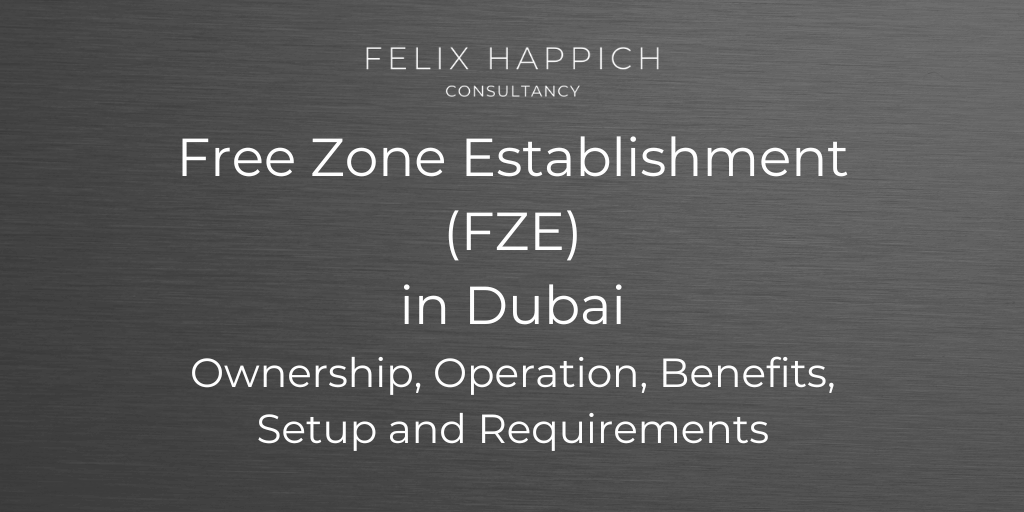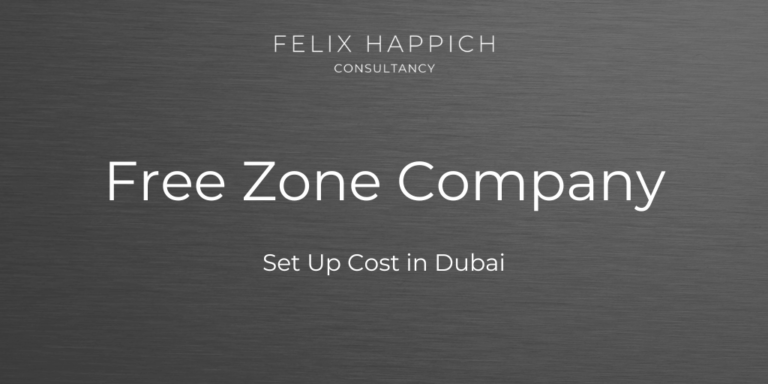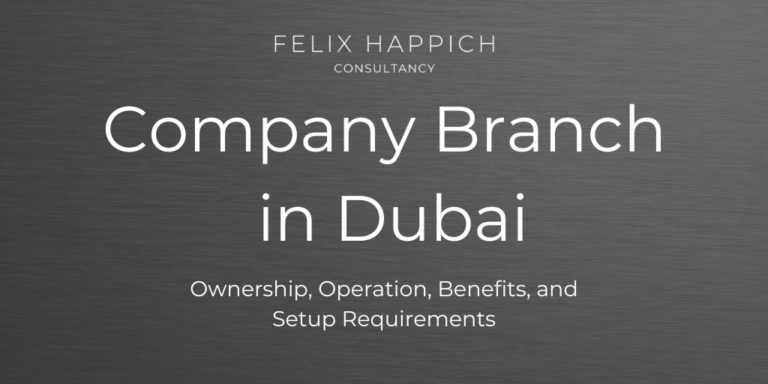A Free Zone Establishment (FZE) is a legal business entity in Dubai free zones. It is owned by a single individual, who may be a natural or juristic person per the specific free zone authorities. For example, Jafza mentions solo ownership in its Companies Implementing Regulations 2016. As an independent legal entity, it offers limited liability protection as per Article 71 of Federal Decree-Law No. 32 of 2021, which is part of the UAE Commercial Companies Law. This keeps business liabilities separate from the owner’s assets.
FZEs are fully owned by their investors. This means they allow 100% foreign ownership and grant the ability to operate with significant autonomy. Though these companies operate under the jurisdiction of a specific Free Zone Authority, they must align with UAE Commercial Companies Laws (Federal Decree-Law No. 32 of 2021). For example, the JAFZ, DAFZ, and DMCC state on their official websites that you can own an FZE fully, which aligns with the law. These authorities issue licenses, oversee compliance, and ensure adherence to UAE business regulations.
To begin operations, an FZE must obtain a free zone license following incorporation. The entity’s operations are governed by its Memorandum and Articles of Association, which outline its specific rules and objectives. This helps in the legal and transparent operational journey of the company. Also, the minimum capital requirement is set by these authorities which we will be discussing in detail.
The advantages of establishing an FZE are notable. Businesses benefit from 100% import and export tax exemptions for qualifying income as per the UAE Corporate Tax Law (Federal Decree-Law No. 47 of 2022). However, a 9% corporate tax is applied to non-qualifying incomes according to this law. Free Zone Establishments also enjoy 100% capital and profit repatriation. This means investors can transfer all profits generated by the FZE to their home country at any time as per UAE Federal Law No. 8 of 1984 (as amended by Law No. 2 of 2015) on Commercial Companies and free zone regulations.
What is a Free Zone Establishment in Dubai?
A Free Zone Establishment (FZE) in Dubai is a single-owner limited liability company within a designated free zone offering 100% foreign ownership(sole proprietorship), significant tax advantages (often including 0% tax on qualifying income), and overseen by the respective free zone authority. The owner can be an individual or a juristic entity, such as a company, and will have its privileges and rights as per the specific regulations of each free zone authority, such as the Companies Implementing Regulations 2016 of JAFZA.
The purpose of an FZE is to promote business growth in Dubai by empowering investors with full control over their businesses without the need for a local sponsor making decision-making easy. Along with this, it also aims to provide asset protection by securing personal income separately from company dealings, to avoid any loss of personal assets in the event of company failure.
How FZE Operates in Dubai Free Zones?
FZE (Free Zone Establishment) operates under specific regulations set by the free zone authority, following UAE Commercial Companies Laws. For example, FZE can not operate in the JAFZ without having a license as per the Companies Implementing Regulations 2016 of JAFZA. Similarly, all free zone has their regulations for FZE operations. This is because the free zone is an independent jurisdiction according to the UAE’s Federal Law No. 8 of 2004.
Each Free Zone has specific rules for different company types regarding their operational requirements. For example, an FZE in JAFZA must appoint at least one director; one person may serve as both director and manager, as stated on the JAFZA official website.
FZE-type companies are limited to operating within the free zone. However, to conduct business activities outside the free zone, investors can obtain a mainland license from the DED with permission from the free zone authority, as per the UAE’s official website.
How many shareholders are there in FZE?
There is only one shareholder in FZE (Free Zone Establishment). The shareholder is allowed for 100% foreign ownership. The owner/shareholder can be an individual or a corporate entity like a company having all rights like an individual. For example, in the Jebel Ali Free Zone (JAFZA), a company can own FZEs as single shareholders who operate independently without needing a local sponsor according to Jabel Ali Free Zone Companies Implementing Regulations 2016.
Free Zone Establishment (FZE) Setup Process
Setting up an FZE in the Dubai Free Zone requires following a unique legal and regulatory framework to have unrestricted operations. The process is mostly similar to other free zone entities, such as FZCO or FZLLC company formation. First, you have to register a trade name and select a specific free zone. The next step is to specify the exact business entity type that is primarily regulated by free zone authorities and federal bodies like the DED, FTA, and the Ministry of Economy. The main process for FZE setup is mentioned below.
- Submit trade name registration
- Submit the initial approval application
- Submit the required documents
- Secure office space
- Pay licensing fees
- Provide proof of sufficient share capital
- Open a bank account and apply for desired visas
- Comply with annual maintenance obligations
What is the cost of a Free Zone Establishment (FZE) set in Dubai?
The cost of setting up a Free Zone Establishment (FZE) in Dubai ranges from 15,000 AED to 45,000 AED. However, the cost depends on several factors. The five main factors include:
- The free zone
- The business activity
- The license type
- The office space
- The number of visas
However, to help you in a much better way even though our experts have detailed cost analyses for the above factors. The below table provides the cost only including the broad section for detailed analysis you can consult with our expert.
| Cost Component | Estimated Cost (AED) |
| License Fee | 5000 AED – 15000 AED |
| Office Lease | 6000 AED – 8000 AED |
| Immigration Card | 500 AED – 1,500 AED |
| Visa Fees | 4000 AED – 5000 AED per visa |
| Audited Financial Statements | Varies |
| Share Capital (if required) | Varies |
Additional costs may also apply like service fees but this highly depends on the free zone. Overall the total initial cost for FZE setup ranges from AED 15000 to AED 50000.
How much time is required to set up a Free Zone Establishment in Dubai?
The time required to set up a Free Zone Establishment (FZE) in Dubai is different for different conditions. It typically takes 1 to 4 weeks. This depends mainly on the specific free zone authority and the consulting firm you choose. For instance, with Felix Happich Consultancy, you can complete the setup in just 9 days.
What are the legal requirements to set up a Free Zone Establishment in Dubai?
The legal requirements to set up an FZE within the free zone in Dubai are mentioned below.
- Business License
- Shareholders and Directors
- Share Capital
- Office Space
- Documentation
- Auditing and Reporting
- Physical Presence (Optional for owners)
Business License:
A business license is compulsory for FZE to have legal operations in free zones. It is provided by the free zone authority as per Federal Law No. 2 of 2015 on Commercial Companies and the regulations specific to each free zone.
Shareholders and Directors:
A minimum of one shareholder, one director, and a company manager must be appointed. The shareholder can also serve as the director, effectively holding both positions. For instance, according to the JAFZ official website, you must have a manager, a director, and a single shareholder for an FZE.
Share Capital:
Each free zone has a specific amount of share capital which investors have to fulfill. However, to increase or decrease the share capital, the owner’s approval is required, as stated on the Multilaw official website. Overall the minimum share for LLCs in the UAE ranges from AED 2,000 to as much as AED 1,100,000 AED.
Office Space:
Renting office space within the free zone is mandatory as it affects visa eligibility. For FZE owners, the free zones offer office space for purchase or rent, with virtual offices accepted for freelancer licenses as per the official website of the UAE Ministry of Economy.
Documentation:
For FZE investors have to submit a passport copy, proof of address, and a No Objection Certificate (if employed). Along with this for corporations, he has to submit an attested Certificate of Incorporation, Articles and Memorandum of Association, Board Resolution, Power of Attorney, and details of the Ultimate Beneficial Owner (UBO).
Auditing and Reporting:
The auditor must audit the company once during each financial year, which generally runs from January to December. However, for the first year, the financial year will be based on the date of incorporation as per Companies Implementing Regulations 2016.
Physical Presence:
An FZE does not require any physical presence as it is governed by the rules and regulations of the free zone. The regulations are set by the respective Free Zone Authority (FZA) which do not mandate the physical presence of the owner or shareholders within the UAE. However, the physical presence of directors or incorporators may be required during incorporation.
What are the Advantages of Free Zone Establishment in Dubai?
The advantages of a Free Zone Establishment (FZE) in Dubai include operational ease, business control, asset protection, and 100% repatriation of profit. Below are the 11 key advantages of FZE in Dubai free zones:
- 100% Ownership
- Tax Benefits
- Repatriation of Profits
- Simplified Business Setup
- Strategic Location
- Wide Range of Business Activities
- Customs and Logistics Support
- Advanced Infrastructure
- Flexible Visa Options
- Regulatory Support and Guidance
- Networking and Collaboration
What are the Disadvantages of Free Zone Establishment (FZE)?
The 5 disadvantages of Free Zone Establishment (FZE) in Dubai are provided below:
- Limited Market Access within the UAE
- Mandatory Office Space Requirement for directors and manager
- Ownership Transfer Process needs additional approvals
- Inability to Expand Beyond Free Zones Without a Local Partner
What is the difference between FZE and FZCO?
The difference between an FZE and an FZCO includes the number of shareholders, ownership structure, and decision-makers. The table below outlines the key differences between an FZE and FZCO
| Criteria | FZE (Free Zone Establishment) | FZCO (Free Zone Company) |
| Number of Shareholders | 1 (Single shareholder, individual or corporate) | 2 to 50 shareholders |
| Ownership | 100% foreign ownership | 100% foreign ownership, but can have multiple shareholders |
| Management | Managed by one director and a secretary (can be the same person) | Typically one director required (number may vary by Freezone) |
| Liability | Limited liability, restricted to the capital invested | Limited liability, restricted to the capital invested |
What is the difference between FZE and FZ LLC?
The difference between an FZE and an FZ LLC is that an FZE is designed for a single shareholder, whereas an FZ LLC requires two or more shareholders. Both offer limited liability protections and operate within free zones but differ in ownership structure.
| Criteria | FZE (Free Zone Establishment) | FZ LLC (Free Zone Limited Liability Company) |
| Number of Shareholders | 1 (Single shareholder, either individual or corporate) | 2 to 50 shareholders (can be individuals or corporate entities) |
| Ownership | 100% foreign ownership | 100% foreign ownership (multiple shareholders possible) |
| Management | Managed by one director and a secretary (can be the same person) | Typically one or more directors; structure varies by Freezone |
| Liability | Limited liability, restricted to the capital invested | Limited liability, restricted to the capital invested |
| Business Activities | Limited to the business activities as specified by the free zone | Broader scope of activities may be allowed, depending on the free zone’s regulations |
What is the difference between FZE and PLC?
The FZE and PLC vary in terms of shareholder requirements, ownership structure, capital demands, setup expenses, and operational criteria. The table below outlines the key differences between a Free Zone Limited Liability Company (FZE) and a Public Listed Company (PLC).
| Aspect | Free Zone Establishment | Public Listed Company |
| Abbreviation | FZE | PLC |
| Number of Shareholders | Single shareholder | Two to multiple shareholders |
| Ownership | 100% foreign ownership | 100% foreign ownership |
| Type of Entity | Limited liability company | Public joint-stock company |
| Capital Requirement | require specific paid-up capital. | Higher capital requirements |
| Setup Time | 1-2 weeks. | 1-5 weeks |
| Setup Cost | 15000-45000 AED | 20,000-70,000 AED |
| Decision-Maker | A single shareholder with full decision-making authority. | Board of directors accountable to shareholders. |
| Visa Options | a limited number of visas, subject to free zone regulations | Multiple visas, facilitating a larger workforce. |
| Office Space (Physical) | May require smaller office space | Requires larger office space |






